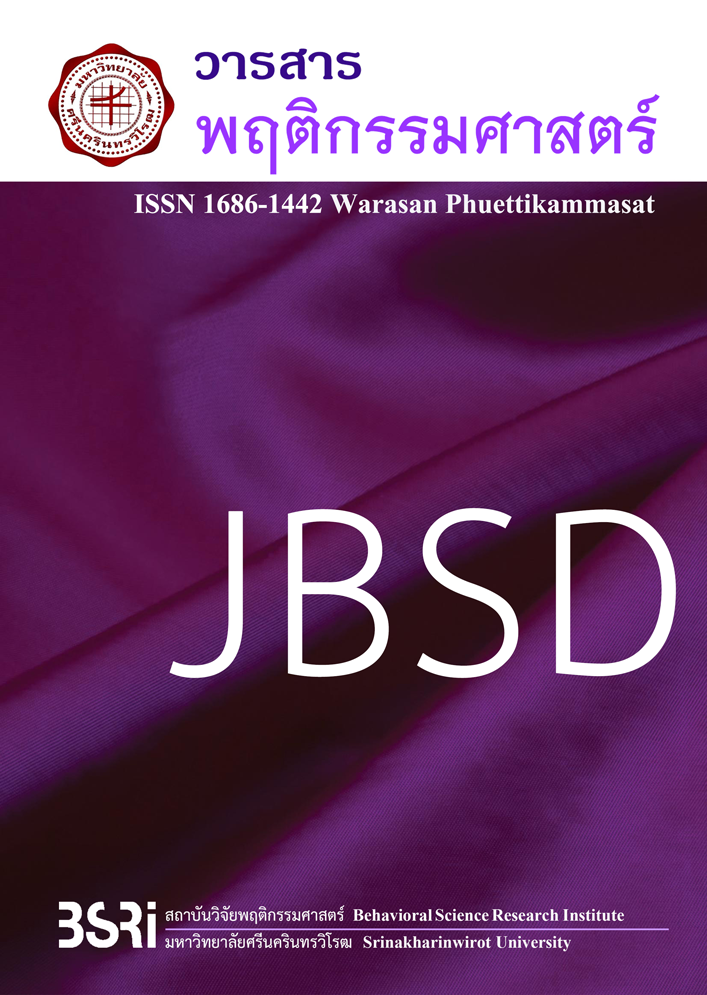The Lifelong Learning Mindset Model of Private University Undergraduate Students, Bangkok Metropolis
Abstract
รูปแบบกรอบคิดใฝ่เรียนรู้ตลอดชีวิตของนักศึกษาปริญญาตรีมหาวิทยาลัยเอกชนในเขตกรุงเทพมหานครThe objectives of this research were 1) to studythe lifelong learning mindset factors of private university undergraduatestudents in the Bangkok metropolis, 2) to construct a lifelong learning mindsetmodel of private university undergraduate students in the Bangkok metropolis,and 3) to evaluate the effectiveness of the lifelong learning mindset model ofprivate university undergraduate students in the Bangkok metropolis. The sampleof the study included 2 groups. The first group consisted of 600 undergraduatestudents from 9 private universities in the Bangkok metropolis. The secondgroup consisted of 40 undergraduate student volunteers from Rattana BunditUniversity who received the lowest lifelong learning mindset scores. They werethen divided through simple random sampling into an experimental and a controlgroup, 20 subjects in each group. The research instruments were 1) the lifelonglearning mindset scale with the total reliability coefficient (alpha) of 0.862and its construct validity confirmed through factor analysis. In theexploratory factor analysis with KMO=.957 and the communalities ranging from.424 – .724, there were 9 components of eigenvalues more than 1, and theconfirmatory factor analysis with goodness of fit were as follows: = 1328.07 (p=0.0), /df=1.77, GFI=0.90, AGFI= 0.89, CFI=0.99, RMR=0.016 andRMSEA=0.036. 2) The lifelong learning mindset model had an item objectivecongruence (IOC) of 1.00. The research results were as follows: 1) the totalmean score of the lifelong learning mindset of the 600 subjects was high, themean score of the dimensions of the development mindset was very high as wellas the mean scores in descending order of the active learning mindset, thewillpower mindset, the means mindset, the challenging mindset, the implementationmindset, the curiosity mindset and the modeling mindset, respectfully. 2) Thelifelong learning mindset model included the concepts and learning managementof learning psychology theories. These theories were self-theories ofintelligence, information processing theory, social cognitive theory,experiential learning, and learner-centered learning. The model was implementedthrough 5 stages: concrete experience, reflective observation, abstractconceptualization, active experimentation, and the lifelong learning mindsetreflection. 3) The lifelong learning mindset of the experimental group afterparticipating in the lifelong learning mindset model was significantlyincreased at .01 level and 4) the lifelong learning mindset of the experimentalgroup after participating in the lifelong learning mindset model wassignificantly higher than that of the control group at .01 level. Keywords: Model, The lifelonglearning mindset, Private university, Undergraduate studentsบทคัดย่อ การวิจัยนี้มีวัตถุประสงค์เพื่อ 1) ศึกษาองค์ประกอบกรอบคิดใฝ่เรียนรู้ตลอดชีวิตของนักศึกษาปริญญาตรีมหาวิทยาลัยเอกชนในเขตกรุงเทพมหานคร 2) สร้างรูปแบบกรอบคิดใฝ่เรียนรู้ตลอดชีวิตของนักศึกษาปริญญาตรีมหาวิทยาลัยเอกชนในเขตกรุงเทพมหานคร และ 3) ประเมินประสิทธิผลของรูปแบบกรอบคิดใฝ่เรียนรู้ตลอดชีวิตของนักศึกษาปริญญาตรี มหาวิทยาลัยเอกชนในเขตกรุงเทพมหานคร กลุ่มตัวอย่างที่ใช้ในการศึกษาองค์ประกอบกรอบคิดใฝ่เรียนรู้ตลอดชีวิตได้แก่ นักศึกษาปริญญาตรี มหาวิทยาลัยเอกชนในเขตกรุงเทพมหานคร 9 แห่ง จำนวน 600 คนและกลุ่มตัวอย่างที่ใช้ในการประเมินประสิทธิผลของรูปแบบ ได้แก่อาสาสมัครนักศึกษาปริญญาตรี มหาวิทยาลัยรัตนบัณฑิตที่มีคะแนนกรอบคิดใฝ่เรียนรู้ตลอดชีวิตต่ำสุดจำนวน 40 คน เครื่องมือที่ใช้ในการวิจัย ประกอบด้วย 1)แบบวัดกรอบคิดใฝ่เรียนรู้ตลอดชีวิต มีค่าความเที่ยงโดยรวมเท่ากับ 0.862วิเคราะห์ความตรงเชิงโครงสร้างด้วยการวิเคราะห์องค์ประกอบเชิงสำรวจ พิจารณาจาก KMO=.957, Communalities=.424–.724, สกัดได้9 องค์ประกอบ และการวิเคราะห์องค์ประกอบเชิงยืนยัน พิจารณาจาก =1328.07(p=0.0), /df=1.77, GFI=0.90,AGFI=0.89, CFI=0.99, RMR=0.016, RMSEA=0.036 และ 2)รูปแบบกรอบคิดใฝ่เรียนรู้ตลอดชีวิตมีค่า IOC=1.00 ผลการวิจัยพบว่า1) กรอบคิดใฝ่เรียนรู้ตลอดชีวิตของนักศึกษาปริญญาตรี มหาวิทยาลัยเอกชนในเขตกรุงเทพมหานคร ทั้ง 9 ด้าน มีค่าเฉลี่ยโดยรวมอยู่ในระดับสูงส่วนค่าเฉลี่ยรายด้าน ได้แก่ ด้านการพัฒนามีคะแนนเฉลี่ยสูงสุดและอยู่ในระดับสูงมาก รองลงมาได้แก่ด้านการเรียนรู้เชิงรุก ด้านความมุ่งมั่น ด้านวิธีการเรียนรู้ ด้านความท้าทาย ด้านการลงมือปฏิบัติจนเกิดผลด้านความสงสัยใคร่รู้ ด้านการเรียนรู้จากตัวแบบ และด้านความเป็นพลวัต อยู่ในระดับสูง 2)รูปแบบกรอบคิดใฝ่เรียนรู้ตลอดชีวิตเป็นผลจากการบูรณาการสังเคราะห์แนวคิดและการจัดการเรียนรู้ของทฤษฎีทางจิตวิทยาที่ประกอบด้วย ทฤษฎีแห่งตนทางปัญญา ทฤษฎีการประมวลสารสนเทศ ทฤษฎีปัญญาสังคมการเรียนรู้แบบเน้นประสบการณ์ และการเรียนรู้โดยเน้นวิธีการเรียนรู้เป็นสำคัญ ซึ่งมีกระบวนการเรียนรู้5 ขั้นตอน ได้แก่ ขั้นนำเสนอประสบการณ์รูปธรรม ขั้นสะท้อนความคิด ขั้นสร้างแนวคิดขั้น ฝึกปฏิบัติ และขั้นสะท้อนกรอบคิดใฝ่เรียนรู้ตลอดชีวิต3) กรอบคิดใฝ่เรียนรู้ตลอดชีวิตของกลุ่มทดลองหลังการทดลองสูงกว่าก่อนการทดลองอย่างมีนัยสำคัญทางสถิติที่ระดับ.01 และสูงกว่ากรอบคิดใฝ่เรียนรู้ตลอดชีวิตของกลุ่มควบคุมอย่างมีนัยสำคัญทางสถิติที่ระดับ .01 คำสำคัญ: รูปแบบกรอบคิดใฝ่เรียนรู้ตลอดชีวิต มหาวิทยาลัยเอกชน นักศึกษาปริญญาตรีDownloads
Download data is not yet available.
Published
2014-01-29
How to Cite
จำปารัตน์ ส. (2014). The Lifelong Learning Mindset Model of Private University Undergraduate Students, Bangkok Metropolis. The Periodical of Behavioral Science, 20(1). retrieved from https://so06.tci-thaijo.org/index.php/BSRI/article/view/15846
Issue
Section
Research Article
License
Behavioral Science Research Institute, SWU
114 Sukhumvit 23, Bangkok 10110, Thailand.
Tel.02-649-5000 # 17600



